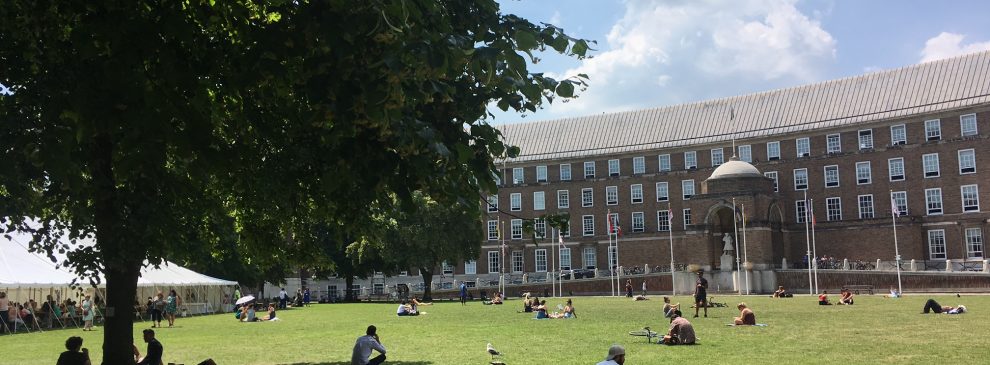Blog originally posted to ICC website 26th June 2017: Kerry Wilson reflects on the Culture, Health and Wellbeing International Conference in Bristol, 19-21 June 2017, including the notable mobilisation of the field as a political movement.
 Last week I had the real pleasure of attending the international Culture, Health and Wellbeing conference in Bristol and re-connecting with one of my most valued networks. I was inspired in part to join this year’s event by the opportunity to hear outcomes of the All-party Parliamentary Group (APPG) on Arts Health and Wellbeing inquiry, launched in 2015. In his keynote speech, Co-Chair of the APPG the Rt Hon Lord Howarth of Newport presented headline findings and recommendations from the Creative Health report, which will be formally launched at Westminster on 19th July.
Last week I had the real pleasure of attending the international Culture, Health and Wellbeing conference in Bristol and re-connecting with one of my most valued networks. I was inspired in part to join this year’s event by the opportunity to hear outcomes of the All-party Parliamentary Group (APPG) on Arts Health and Wellbeing inquiry, launched in 2015. In his keynote speech, Co-Chair of the APPG the Rt Hon Lord Howarth of Newport presented headline findings and recommendations from the Creative Health report, which will be formally launched at Westminster on 19th July.
The report was described as a ‘uniquely comprehensive overview of the field’, with the potential to meet the major challenges currently facing health and social care sectors. Recommendations include more effective co-ordination via the formation of a national strategic centre with a network of local champions. The centre will subsequently lead on a range of strategic objectives, including training and development for health and social care professionals; connecting existing networks across the arts, museums, heritage and libraries; informing public debates on major issues; and facilitating different collaborative models of leadership and innovation.
With true oratory prowess, Lord Howarth opened his keynote by reflecting on recent public tragedies, remarking that ‘the cult of market forces has shattered cohesion in our societies’ and that the ‘arts and health movement will be instrumental’ as a values-based alternative form of social renewal. From an observational perspective, this narrative reflected the tone of the conference and its many confident and ambitious key messages. This was not a defensive community of interest preaching to the converted, but a proactive community of practice ready to lobby and campaign.
Speaking to power
The different contexts in which active lobbying and campaigning are becoming more possible – described as an ‘evolving political architecture’ – were discussed in a parallel session on national policy in arts, health and wellbeing. These included devolution, with a galvanising talk from Clive Parkinson on integrated health and social care in Greater Manchester; cultural commissioning and social prescribing with best practice guidance from NHS Gloucestershire CCG; and evidence and advocacy from the What Works Wellbeing programme, led by Norma Daykin.
The need for a ‘shared language’ between health and cultural sectors is regularly raised in these discussions, especially with regards to the measurement and articulation of value and health-related outcomes. It was refreshing to hear a different emphasis from conference delegates, including several references to a need for shared medical, emotional and cultural literacy. In a moving keynote on cultural literacy and the care of the dying, Dr Iona Heath sensibly questioned the use of clinical responses to what are essentially existential crises. This discursive shift and prioritising of cultural values again illustrates confidence in the field’s cross-sector relevance and contribution.
The mechanisms to mobilise
The arts and health movement has benefited unquestionably from the work that has gone into organising the field. It is characterised and defined by committed leadership across international networks; eminent scholars, generating a reliable evidence base; dedicated journals and key texts; distinguished advocates from health professions; and a culture of collaborative working. It is this level of cross-sector organisation that facilitates mutually beneficial vocabularies and was instrumental in making the APPG inquiry happen, with support from the National Alliance for Arts, Health and Wellbeing, Kings College London, Guy’s and St Thomas’s Charity, the Royal Society for Public Health, Paul Hamlyn Foundation, Wellcome Trust and Arts and Humanities Research Council.
In another parallel session on museums and mental health, operational mechanisms for generating a shared language were discussed, including the importance of project steering groups with members from all stakeholder communities. Drawing upon my own research, I have written before about House of Memories, the dementia awareness programme led by National Museums Liverpool (NML), as a model for scalable cultural interventions in health care. The mechanisms that underpin its success include long-term, strategic cross-sector peer support relationships and operational delivery partnerships; embedded principles of co-design and production with stakeholder groups; and most significantly an organisational culture of ethical, politically-engaged collaborative leadership at NML. Research on managing and leading in inter-agency settings points to the ‘crucial’ role of leaders in shaping the meaning attached to collaborative ventures.
The Creative Health report represents an important strategic milestone in attaching meaning to the arts and health movement, providing a reference point and form of political literacy for future evidence-based practice and policy making. Thanks to all those involved in the APPG inquiry’s creation, progress and administration, and the truly mobilising Culture, Health and Wellbeing conference.